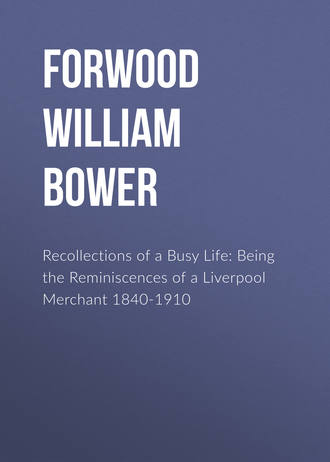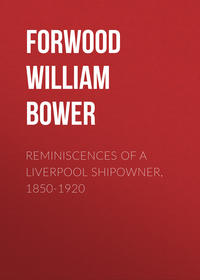 полная версия
полная версияRecollections of a Busy Life: Being the Reminiscences of a Liverpool Merchant 1840-1910
Competition has always been very keen, and the cry has ever been for the return of those good old days when competition was less. If they ever existed, it was before my time.
Everything, however, is comparative. With larger numbers of people there must be more competition, but there are also more opportunities, more employment, more people to feed, and more to clothe.
But with the advance of education, particularly of technical knowledge, the competition has become more intense in the higher branches of industrial and intellectual activity; still, there is room, and ample room, on the top. The lower rungs of the ladder are well occupied, but the numbers thin off as we approach the top, and this must be more and more the case as education advances.
The hurry of the present day is prejudicial to that thoroughness which is necessary if we are to attain efficiency. The hurry of everyday life becomes more and more conspicuous. Living at high pressure, in this super-heated atmosphere we are apt to lose our sense of proportion, and crowd our minds with thoughts, schemes and projects regardless of our power of assimilation and arrangement. Our minds are apt to become mere lumber rooms, into which everything is tossed. Many things are forgotten, and cannot be found when wanted. How much better it would be for ourselves and for the world at large if we could live with more deliberation, if we could specialise more, be more intense within a more limited range of thought and activity, less casual, more thorough in the commonplaces of life. Life would not lose in interest or picturesqueness, and it would gain in symmetry and value. It may be said that while it might add to the effectiveness of life, it would deprive it of much of its colour and romance; this would not, however, necessarily follow. On the contrary, greater effectiveness would open out new avenues for thought and action, new spheres of usefulness, more refined and elevating in their character, and more satisfying in their results.
These appear to be surroundings in which we have to work out the problems of our lives, and this leads us to the consideration of how we are to achieve success under these conditions of competition and hurry.
Success in Life
There are various kinds of success in life: business success, social success, and success in public affairs. Perhaps to the ordinary individual business success is the most important; it is a source of happiness, promotes social success, and opens up avenues of public usefulness.
If we look back and endeavour to trace the careers of those with whom we have been associated when young, I think we shall observe that those who have been most successful in their business careers have, with few exceptions, not been the brilliant and clever boys, but rather those of duller intellect, who have had the gift of steady application. This faculty is not born in us; we are by nature casual, and apt to follow the lines of thought and endeavour which require the least labour, and offer the most varied interest. We hate the grind of sustained effort, it bores us, and we long for something new. This dislike of prolonged application, and desire for change, has made more shipwrecks of business careers than perhaps any other cause. In its craving for change and excitement, it leads to speculation as a possible road to wealth without effort.
The power of steady application must be inculcated in the school, by insisting that every subject taught shall be mastered by the boy, and not left until he has made it his own, and is able to clasp his hands on the far side of it. A few subjects taught and mastered in this way are of more value than a whole curriculum of studies learnt in a superficial and casual manner. We are apt to forget that the primary object of all education must be to train the mental faculties and to educate the judgment. We are too prone to cram the boy with knowledge which he has not the power to assimilate and make his own. We set out too often with the presumption that as a boy is born with legs and arms which are ready for use, so he must be born with a brain ready cultivated. The arms and legs do their work very much better if they are trained and strengthened by gymnastic exercises. In like manner the brain requires training – for this reason I have always regretted the gradual elimination of Greek and Latin from our national system of education. I know of nothing to take their place as a gymnastic for the mind.
We too often send boys into the world to handle the most mighty weapons for weal or for woe, "capital and credit," without any proper mental equipment.
The lack of hard mental training is more far-reaching and disastrous than is generally supposed. The want of accuracy leads to many mistakes. Mistakes lead to excuses, and excuses mark the high road to lies. The absence of accuracy is the fruitful parent of carelessness in thought, in habit, and in the discharge of the duties of everyday life. I fear this is a national weakness, for I have found that the German clerk excels in accuracy; he may be wanting in initiative, but he is accurate and reliable in his work. Englishmen have, however, remarkable gifts for a business career, if they are properly trained and educated. A good English man of business is the best in the world, he has great initiative, the power of getting through work, the talent to observe and to form a rapid judgment, but he is not born with these accomplishments, they are largely the result of education and training.
There is a great reluctance in this country to introduce any system of compulsory military service. Without dwelling upon its advantages to the nation, as likely to increase the physique of our men, military discipline would have a very beneficial moral effect. Probably one of the most valuable traits of character is that of "obedience," and this would be cultivated and enforced by military drill, and I think it would also add to our self-respect. As things are moving we are in danger of becoming a nation of "slackers," both physically and mentally.
I have already spoken of the necessity for steady perseverance and accuracy if we are to make a success in life, but there are two other qualities which are also essential to success, the capacity to observe, and the gift of imagination.
Observation
The number of men who go through life with their eyes closed is astonishing. These men regret their want of luck, they say they have had no chances; alas! they have had their chances but either failed to see them, or lacked the courage or capacity to take advantage of them.
The world is so constituted that changes are ever taking place, and every change is fruitful of opportunities. We hear it said of some that everything they touch turns into gold. It is only another way of saying that they are ever on the look-out for opportunities, and are not laggards in turning them to good account.
Imagination
The want of imagination prevents many men from making use of their opportunities. Upon a dull day, when the clouds hang in the valleys, and obscure from view the tops of the mountains, imagination fills up the picture, and probably paints the crests of the mountains much higher than they really are. Too many men travel only in the valleys of life, content with what they see; and imagine nothing above or beyond. Suppose, for instance, a serious disaster overtakes the harvest. The man endowed with imagination will look beyond the disaster and note its far-reaching effects, and in them recognise his opportunities for action.
General Sir Richard Baden-Powell is doing an excellent work with his "boy scouts," not only in teaching discipline, but in encouraging the habits of observation and imagination, which will be of the greatest value to them in after-life.
I have touched upon three points necessary to success in life, "thoroughness and accuracy," the faculty of "observation," and the gift of "imagination," because they are but seldom prominently referred to. It is not needful to enlarge upon the value of character nor upon the necessity for "integrity." Of nothing am I more certain, than that "Honesty is the best policy." I can think of no career which has been permanently successful, in which this "golden rule" has not been observed. Speculation is the gambler's road to fortune. It has many ups and downs, and generally leads to disaster and the "slough of despond." But there is a wide gulf separating speculation from the enterprise of the genius that foresees and devises new methods of trade, or anticipates, as the result of careful observation and calculation, changes in the market value of securities and commodities.
Enterprise degenerates into speculation when the dictates of caution and prudence are set aside. To use the words of an old and much respected Liverpool merchant, who recently passed away, "Commercial success requires the concurrence of two contrary tendencies, caution and enterprise. Caution is necessary in avoiding risks, in foreseeing consequences, and in providing against contingencies, even remote ones. But this will not carry a man far, he must also have the brain to originate, and the courage to strike when a favourable opportunity occurs. What we call a sound judgment is the due balance and just proportion of a well-stored mind. In no department of life is there more need for this balance and proportion than in the higher walks of commerce. The head of a great firm needs be a statesman, an economist, and a financier, as well as a merchant."
I had proposed to conclude this sketch by a short account of the men of my time still living, who have been active in the making of Liverpool, but so many have lent a helping hand, the work having been that of the many rather than of the few, that it would be impossible to avoid being invidious. Events move so rapidly, the men and circumstances of to-day are crowded out and their memory obliterated in the new interests of tomorrow, that no man's work or influence can be said to have exercised more than an evanescent power; yet Liverpool has been built up – its commerce, its municipality, and its charitable and philanthropic work – by leaders of men who have found their work lying at their hand and have done it, and have done it well.
My story must now end. It has necessarily been told in a somewhat desultory manner, leaving out many details and many incidents which might have added to its completeness. But if it interests any of my kin or my friends, and still more, if it inspires them to make some effort on behalf of our great and glorious city – to elevate its social and intellectual life, to adorn and beautify its public streets and places, to brighten the lives and homes of the people, to carry forward and onward the great temple we are building to the glory of God – it will not have failed in its purpose.




